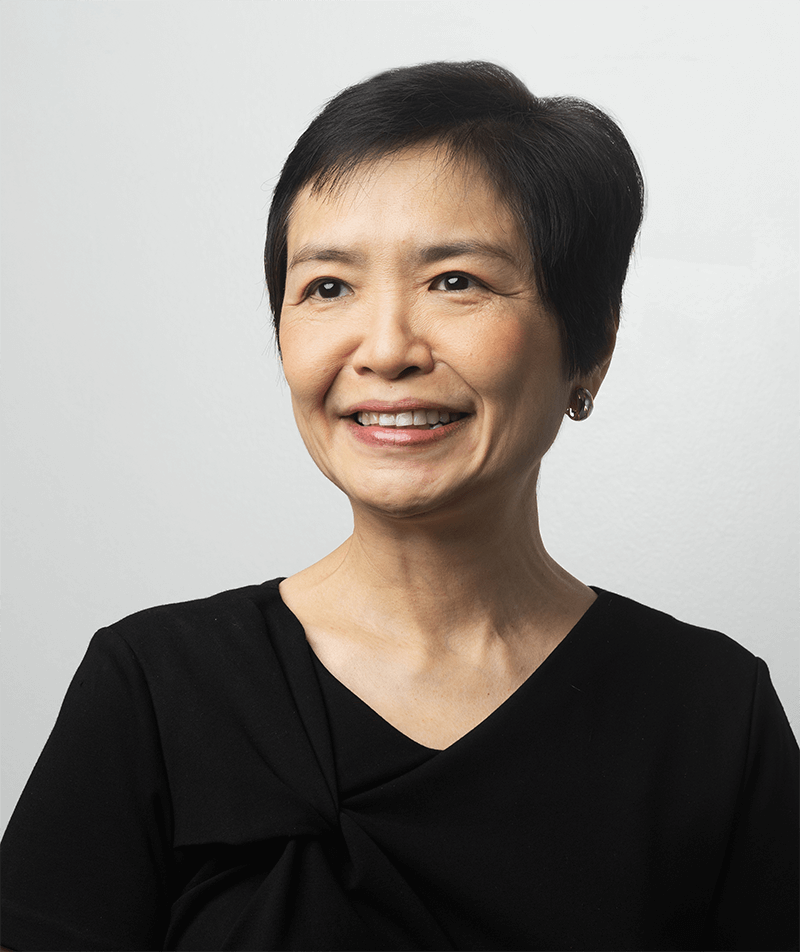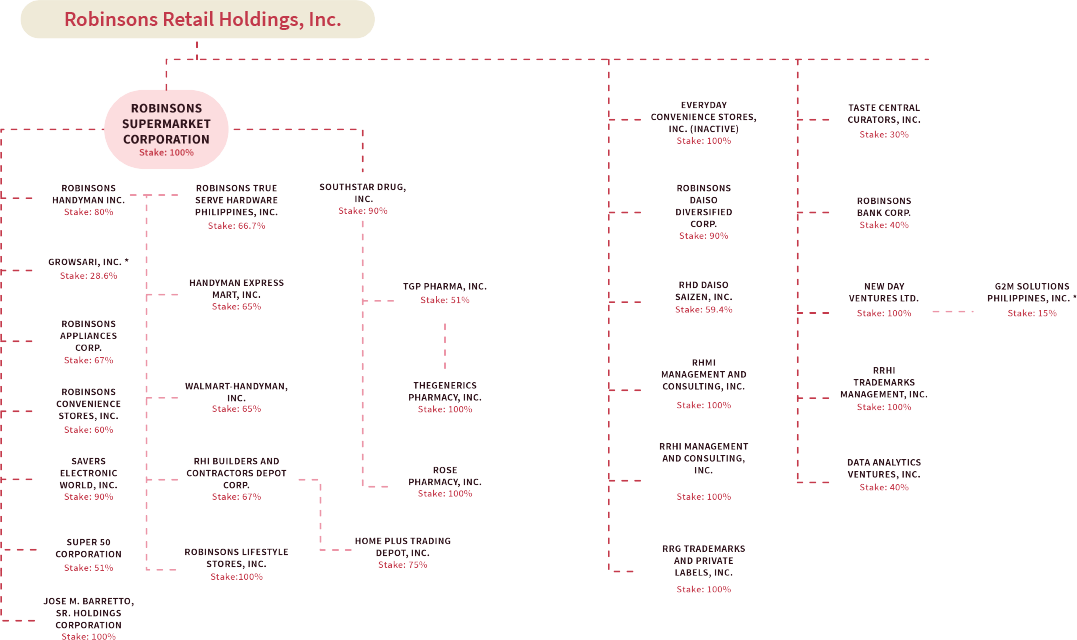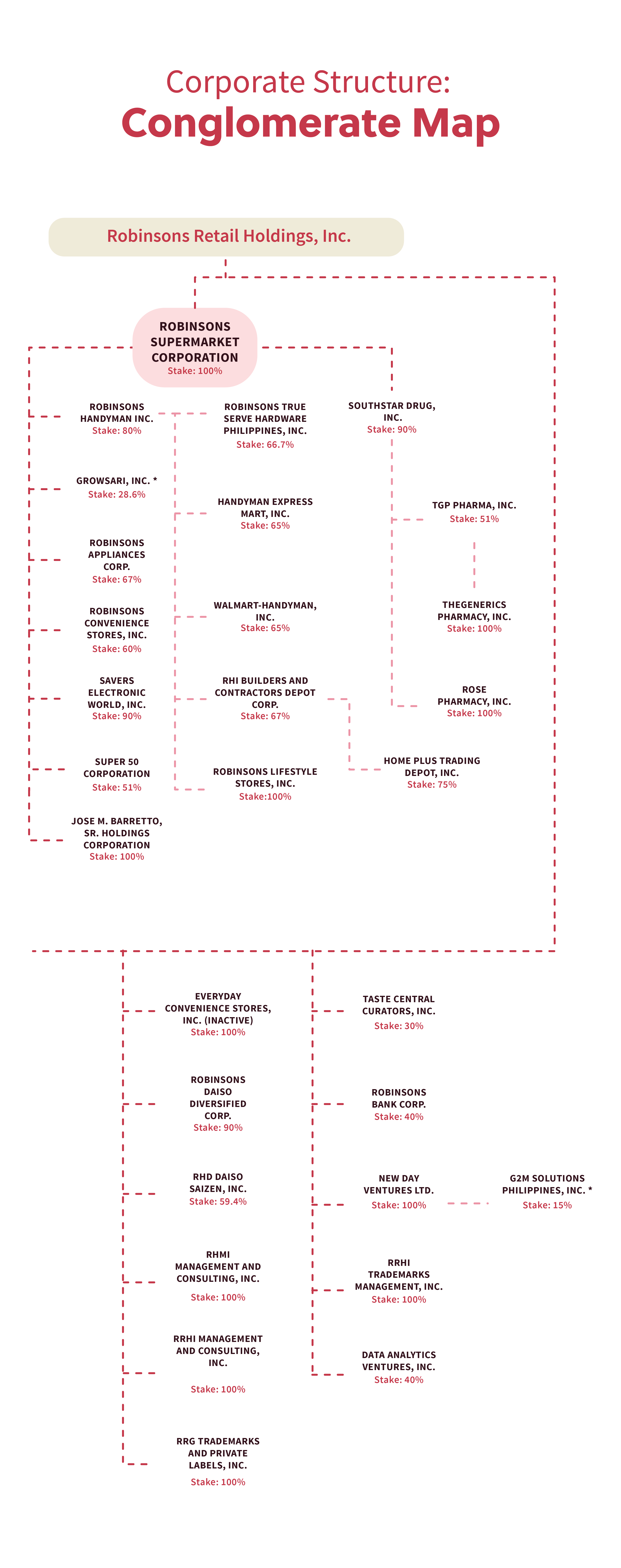Chairman &
President’s Message
Dear Shareholders,
This year, we are sharing with you a combined Annual and Sustainability Report for Robinsons Retail Holdings, Inc. 2020 was marked by the emergence of the COVID-19 pandemic, and needless to say, it was a difficult year for everyone. The virus tested our flexibility to remain operational in the face of large-scale disruption, and our capability to respond to the call of greater involvement from the private sector to aid communities in crisis.
But it was also a year of triumph where we saw shining moments of collective action. We believe there is reason to remain hopeful about the future.
The macro-economic headwinds impacted our financial metrics, but we remained relatively resilient with a decline in net sales of only 7.3% to Php151.1 billion. Our major KPI, same-store-sales (SSSG), however, contracted to -8.9%.
On a more positive note, our Supermarket Segment, whose essential stores remained open as mandated by government during stringent community quarantines, experienced relative stability with full-year sales at Php94.1 billion and SSSG at 7.7%. Further manifesting our digitalization strategies, our e-commerce pivot also came to fruition through our very own order and delivery services. We launched GoRobinsons, which can be downloaded as a mobile app for iOS and Android. This was alongside our continued partnerships with third-party online marketplaces.
On October 30, 2020, we acquired Rose Pharmacy, Inc. from Dairy Farm International Holdings, Ltd. Rose Pharmacy is the leading drugstore chain Visayas and Mindanao, and we added over 297 Rose Pharmacy stores to our network. Together with Southstar Drug’s presence in Luzon and Metro Manila, the acquisition puts in place opportunities to further strengthen our position in the industry, in the same manner that we pursued synergies between Robinsons Supermarket and Rustan Supercenters, Inc. We acquired Rustan Supercenters, Inc. from Dairy Farm as well, which was done through a share-swap agreement in 2018.
We rationalized our banner portfolio as we divested our ownership of Chic Centre Corporation. Lastly, we winded down on our specialty fashion segment, as our UK-based principals, the Arcadia Group, fell into administration and nullified all global franchise agreements.


Of the many lessons we learned, the pandemic further validated a principle that we value in Robinsons Retail’s journey in sustainability: that people are the heart of our business.
Bridging Gaps through Technology
We relied on implementing business continuity programs and strategic ways to take advantage of opportunities in technology. One of the most significant lessons of 2020 in Robinsons Retail was the confirmation that e-commerce was tremendously relevant in addressing the needs of our customers today.
Catalyzed by limited consumer mobility, Robinsons Retail’s e-commerce sales increased exponentially—growing three times from 2019—and contributed. Together with our participation in third-party marketplaces, our brands established virtual Viber communities for click and collect services to ensure that we have alternative means to connect with our customers.
The growth of our e-commerce share was driven by a major strategic step that we pursued in the year, which was the launch of our own e-commerce platforms. In March and August, respectively, Southstar Drug and Robinsons Appliances launched their own e-commerce platforms through their company websites, southstardrug.com.ph and robinsonsappliances.com.ph.
We publicly launched GoRobinsons in June 2020. As our very own e-commerce website, GoRobinsons.ph piloted with order and delivery services for Robinsons Supermarket, and has since then grown to house The Marketplace, Shopwise, Toys ‘R’ Us in 2020, and Handyman and No Brand in February 2021. GoRobinsons is also available as a mobile app downloadable for iOS and Android.
It is important to us to build GoRobinsons.ph in such a way that we make more meaningful connections with our customers. Complementary to our strong offline presence, we envision GoRobinsons.ph to become a lifestyle partner for the Filipino shopper, serving as the Group’s integrated platform that addresses virtually all of our customers’ basic needs, as well as offer diverse options of discretionary products.
As of end 2020, the uptake for GoRobinsons.ph was substantial, with customers in Manila and areas in Rizal. Moving forward, we aim to widen this scope farther to serve more customers across the country.
Prior to the disruption of COVID-19, the indispensable role of e-commerce was already clear for the future of retail. The launches and initiatives we undertook in 2020 were manifestations of a long-term strategy that had its beginnings from our strategic investments in e-commerce platforms such Growsari and BeautyMNL, and participation in third-party marketplaces, which we started to engage as early as 2015. Today, we continue to deepen our presence online retail, continuously learning from our past experiences and coupled with our focus on data and robust loyalty programs.
Our investment in Growsari is aligned with our thrusts for sustainability, as it empowers sari-sari store owners through inclusive business and technology. The B2B platform, which recorded GMV (gross merchandise value) of Php2.0 billion in 2020, allows sari-sari stores to replenish supplies through a mobile-based app, with merchandise being sourced from Robinsons Supermarket stores. BeautyMNL, on the other hand, recorded GMV of around Php900 million and remains one of the largest pure Filipino e-commerce sites. Offering beauty, skincare, and apparel, it campaigns for inclusivity through celebrating Filipina beauty in all its diversity.
Our digitalization thrusts are strategically linked with data analytics. Robinsons Retail has 40% stake in Data Analytics Ventures, Inc. (DAVI), our loyalty and data unit joint venture with JG Summit Holdings, Inc., which oversees the Robinsons Rewards Loyalty program and Cebu Pacific’s GetGo program. Together, the programs have a combined network of 8.9 million members.
DAVI’s data-driven solutions allow for precision marketing and omnichannel campaigns through unique consumer insights, all the while ensuring that consumer rights, data, and privacy are protected. Insights are then translated into responsive promotions and campaigns coursed through the Robinsons Rewards App and the GoRobinsons.ph platform.
Our strategic onboarding of our banners in GoRobinsons. ph, targeted campaigns and loyalty programs are all part of fortifying our digital foundations, and our aim is to bring customers closer to products and services that are meaningful to them at various touchpoints, offering convenience amidst a challenging environment.
Protecting Our People
Of the many lessons we learned, the pandemic further validated a principle that we value in Robinsons Retail’s journey in Sustainability: that people are at the heart of our business.
Entitled “Salute to Frontliners,” this report pays homage to our frontline employees in stores and distribution centers, and we offer our gratitude for essential work they have done at the height of lockdowns due to the pandemic. These include our frontliners in formats that were allowed by government to remain open during the declaration of community quarantine from March 17 to May 15, namely our supermarkets, convenience stores and drugstores. During these eight weeks, our discretionary formats and Head Office remained closed.
We also dedicate this report to all our shared services employees based in our headquarters, our partners, and our loyal customers who continued to support our brands.
One of the first decisions we made in management was to ensure that our employees working onsite were given personal protective equipment (PPEs) and safety training, emphasizing the importance of wearing masks and social distancing. From the declaration of General Community Quarantine on March 12, 2020, we quickly implemented work-from-home arrangements for those who are able to work remotely, and operated with a skeleton workforce among all our departments. This was throughout the subsequent implementation of Enhanced Community Quarantine a week later, the variable lockdowns imposed by government that followed.
We made sure that while in lockdown, we gave incentive allowances to employees working in the frontlines. We conducted regular sanitation and disinfection procedures across all our sites of operations, and required the daily submission of health declaration forms before entering work premises. We implemented policies strictly requiring the usage of facemasks and face shields, and encouraged regular hand-washing and the use of rubbing alcohol and hand sanitizers.
Through COVID Care, the Gokongwei Group’s Telemedicine Hotline, our employees could access information on the virus and consultation services in case they experienced symptoms. For our stores, we put in place mechanisms for contact-tracing in case of infection, and put up information campaigns and highly visible materials to educate our customers on measures to protect themselves as well as others.
Internally, the new reality of quarantine entailed for us to rely more on technology to remain connected as an organization. Face-to-face meetings have inherent advantages as the experience is more personal, but we have learned to adopt virtual means to communicate both with our internal and external stakeholders. The programs we use now to conduct meetings on a regular such as Microsoft Teams and Zoom web conferences, became all the more applicable and crucial in 2020.
Stable internet connection and getting used to talking on screen were minor hurdles we had to overcome, we came to understand more that it gave us certain advantages as well. Going virtual was not only safer, but it gave us the capability to engage more people, such as through our webinar-based town halls, and conference calls with partners both local and abroad. We even began to conduct our training courses online, which gave an avenue for our employees to continue their learning for career development in the company.
Deeper into Sustainability
Sustainability in Robinsons Retail had its foundations in social responsibility and corporate governance. Over the past few years, we delved more into the discourse of further integrating ESG (Environment, Social, and Governance) data and developments into our disclosures. We continue to initiate steps to fully embed Sustainability into the culture of how we do business.
We continued our CSR (corporate social responsibility) projects, many of which were framed in the context of the needs presented by COVID-19 and the numerous natural disasters that hit the country in 2020, from the Taal eruption to Typhoons Rolly, Siony, and Ulysses. Our initiatives in disaster-response are underpinned with a growing understanding of climate change and resilience, and we are in the process of further enhancing our efforts in climate risk assessment and management.
Working with partners such as the Gokongwei Brothers Foundation and World Vision, we were able to provide assistance throughout the year to various groups, from medical frontliners to communities in need through the provision of basic necessities and PPEs, as well as our own employees affected by calamities.
In 2020, we conducted two Sustainability townhalls to have even wider awareness on Sustainability across the Group. We held the first one on February 4, 2020, which explained in detail our vision and roadmap for Robinsons Retail and why Sustainability has become a significant metric among our stakeholders that guides their choices in relation to the company, either as investors or consumers.
Here, we reviewed our Sustainability Framework, which we solidified in 2018, to show how our present activities, such as corporate social responsibility programs, energy-saving measures, compliance to governance standards, and partnerships with small business partners were intimately woven to the overall objectives of fostering a sustainable company.
Conducted on November 11, 2020, our second townhall was held virtually in response to restrictions to mass gatherings, allowing numerous participants from across our business units store and distribution center operations to join remotely. It focused on the Supply Chain and Sustainability, which heavily touches on our materiality and is one of the most complex aspects of our business.
Anchored on efficiency, it involved an overview and structural changes implemented in our Supermarket Supply Chain, as well as improvements in inventory and warehousing in Robinsons Appliances. Looking towards the future, we explored the potential of technology to transform supply chain processes with systems that aided both the business units and suppliers, from real-time data analytics to automation.
Our sustainability journey is far from over. There is still much room to grow in further enhancing our capacities to create positive impacts to society and the environment, navigating through the complexities of sustainability, which in itself is an evolving conversation involving multiple actors and interests. COVID-19 outlined the reality that the private sector indeed plays a pivotal role advancing society towards a more resilient future.
A New Normal,
A New Era for Business
After the shock of 2020, we face 2021 with hope. Through crafting recovery programs and strengthening the health sector, the Philippines is setting the necessary safeguards to rebuilding the economy and the industries that need stimulus to bounce back. We see vaccination roadmaps being put into place with key priorities being frontliners and the most vulnerable sectors, and we see consumer confidence rise as our customers adapt to the routine of wearing masks, sanitation, and social distancing as they go out and visit stores, and greater confidence in e-commerce.
As apocalyptic as our situation seemed at first, we are learning to live with the virus. COVID-19 invited in a new age of reflection and reassessing the structures we have in place for business continuity and sustainable consumption. It will not likely disappear, and new strains and diseases will inevitably emerge, but we are also more prepared than as we were at the beginning of 2020.
We acknowledge the fact that common issues require shared solutions and responsibility. But we are bravely optimistic for the future and our capability to come together. This is evident in our story, as Robinsons Retail faced its toughest year yet and we were able to get through it with the crucial and collaborative work done by our employees and our partners, to whom we remain unceasingly grateful. Likewise, we are grateful to our customers who continue to have faith in us in delivering the goods and services that they need.
Robinsons Retail faced its toughest year yet and we were able to get through it with the crucial and collaborative work of our employees and our partners, to whom we remain unceasingly grateful.
Our hearts go out the countless lives lost and changed by the pandemic. The world is changing, but what remains unwavering is our commitment to all our stakeholders to not simply adapt to new normal, but to work towards a better one.
Sincerely,


Management
Discussion and
Analysis
Robinsons Retail Holdings, Inc. concluded 2020 with Php151.0bn in net sales, down 7.3% versus 2019, as it operated in an austere economic backdrop brought about by the COVID-19 health crisis. Sales of the discretionary formats were mainly affected but the strong performance of the supermarket segment cushioned the effect of the economic downturn, that allowed the company to recover 93% of 2019 pre-pandemic sales.
RRHI’s 2020 sales includes the two month’s results of Rose Pharmacy (RPI) which was acquired by the Company in October 2020. Rose Pharmacy is the leading drugstore player in the Visayas, with Php8.0 billion in annual sales, opening opportunities for synergies and growth in the drugstore business.
E-commerce sales surged three times (3x) compared to the previous year. This trajectory is a result of the Company’s efforts to accelerate growth in its e-commerce presence. Robinsons Retail has taken huge steps towards achieving its long-term goal of becoming an omnichannel business. This comes in time with the lasting societal changes that altered consumer behavior that the once-in-a-century pandemic has brought on.
In 2020, it deepened its digital footprint with the launch of its own e-commerce sites. Southstar Drug launched southstardrug.com.ph on March 11, 2020. GoRobinsons.ph went live to the public on June 3, 2020, initially offering delivery services for food and grocery items from Robinsons Supermarket. By year-end, it has onboarded other banners including The Marketplace, Shopwise and Toys ‘R’ Us and is set to add other formats in 2021. GoRobinsons is integrated with Robinsons Rewards and members can earn and redeem rewards points if they purchase products through the site. In August 2020, Robinsons Appliances also activated its own website—robinsonsappliances.com.ph.
Selling via third-party platforms also remained an important component in RRHI’s efforts to widen its channels to reach customers better. In addition, RRHI provided a click/call and collect/delivery as another integrated access point for customers to reach its products and services. Investments in e-commerce platforms such as BeautyMNL and Growsari had also made its significant contribution to strengthening e-commerce traction.
Meanwhile, Robinsons Retail total store count as of end-December reached 2,157, which included 264 supermarkets, 49 department stores, 225 do-it-yourself stores, 472 convenience stores, 829 drugstores and 318 specialty stores. On top of this are 2,025 franchised stores of TGP.
Blended same store sales growth (SSSG) was -8.9% in 2020 with most formats posting negative SSSG mainly due to the lockdowns imposed by government and ordinances prohibiting individuals below 15 and above 65 years old to go out. Strong supermarket SSSG on the back of pandemic-induced sales counteracted this while the drugstore segment matched the previous year’s SSSG.
Gross profit margin dipped 100 basis points (bps) to 21.8% primarily attributable to mix change given higher-margin discretionary products’ sales decline. Sustained efforts in cost management, on the other hand, pulled down operating expenses as percentage to sales to bring full year EBITDA margin to 8.5%, down by only 50bps.
Net income attributable to equity holders of the parent company ended at Php3.2 billion.
Supermarket
Supermarket segment delivered strong net sales in 2020 that surged 6.3% to Php94.1 billion, given robust SSSG at 7.7%. Topline results were propelled by the pantry loading prior to the lockdown, with increased demand for products in food, cleaning, health and hygiene categories. E-commerce sales breached the Php1 billion mark, recording more than double the sales from 2019.
Supermarket segment delivered strong net sales in 2020 that surged 6.3% to Php94.1 billion.
Department Store
Robinsons Department Store’s total net sales was at Php8.5 billion, down 53.2%, with SSSG at a parallel 52.0% decline with the temporary closure of all 49 stores during the enhanced community quarantine (ECQ) from March to mid May.
However, online sales stepped up, growing by more than 7x from the previous year, including the sales from the call and collect and deliver service We Shop For You. Robinsons Department Store products can also be reached through the GoRobinsons website, and third-party platforms Lazada and Shopee.
Do-It-Yourself and
Big box Hardware
The Do-It-Yourself (DIY) segment contributed Php11.4 billion in net sales with full-year SSSG at -23.4%, impacted by the temporary store closures during the ECQ but partly tempered by the improvement in footfall towards the end of the year. E-commerce sales, on the other hand, grew almost four-folds compared to the previous year.
Gross margin was maintained at 32.5% with better category mix and additional supplier trade discounts, despite the effects of the pandemic.
However, EBITDA margin compressed 70bps to 15.6% but was partly mitigated by cost efficiency improvement efforts that brought down operating expenses (OPEX) to Php2.9 billion from P3.4 billion the previous year.
Convenience Stores
Impacted by COVID-mitigation efforts, Ministop’s full year system-wide and merchandise sales were at Php6.4 billion and P4.8 billion, respectively, with -31.8% SSSG. Sales were partially restored towards the latter part of the year through increased product assortment and restore ready-to-eat (RTE) food sales.
Total e-commerce sales doubled, benefiting from the tie-up with online delivery services. In the third quarter of 2020, Ministop also introduced more financial services, such as e-cash top-up by GCash, Paymaya and bill payments.
Gross profit and royalty income margin dipped 90bps to 34.2% in 2020 due to higher number of company-owned stores. Full-year EBITDA margin was at 6.6% compared to 8.6% in 2019. OPEX declined to Php1.9 billion from Php2.4 billion as result of sustained efforts in cost management including substantial rental discounts which helped mitigate margin contraction.
As of year-end, Ministop had 472 branches and has partnered with Grabfood, Grabmart, Angkas, MyKuya and JoyRide for online delivery services.
Drugstore
Total net sales of the drugstore segment grew significantly by 7.8% to Php19.1 billion in 2020, with the two-month consolidation of Rose Pharmacy. Excluding Rose Pharmacy, net sales increased by 1.1% to Php17.9 billion. Online sales contributed 0.4% of total sales.
Southstar Drug’s SSSG was at par with the previous year. 2019 reflected heightened sales due to the meningococcemia scare, rapid progression of dengue in the country, and flu outbreak. Increase in sales at the early part of the year due to COVID-19 compensated the lower demand for prescription medicines due to the decline in outpatient visits to hospitals.
Total net sales of the drugstore segment grew significantly by 7.8% to Php19.1 billion in 2020.
Specialty Stores
RRHI’s Specialty Segment financials are consolidated from formats under appliances, mass merchandise, toys, pets, fashion and beauty, and Korean grocery No Brand and B2B delivery services Growsari. The segment’s net sales reached Php13.3 billion with the consumer appliances and electronics format contributing 61% of total specialty sales. SSSG ended at -28.0% with sales challenged for most of the year, although slightly lifted by the improvement in the holiday season. E-commerce sales contribution to sales has increased to 1.8% from only 0.7% in 2019.
Gross margin at 20.6% was lower than the previous year, with margin contraction from most segments partially offset by the margin improvement of Toys ‘R’ Us. EBITDA margin, likewise, declined due to challenged SSSG.
Conglomerate Map
Store
Network
264
Supermarket
49
Department Store & Beauty
472
Ministop Convenience Stores
225
Do-It-Yourself & Big Box Hardware
De Oro Pacific Home Plus

